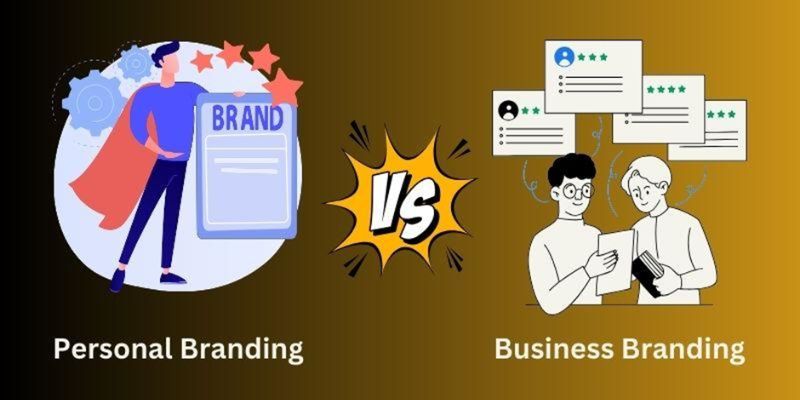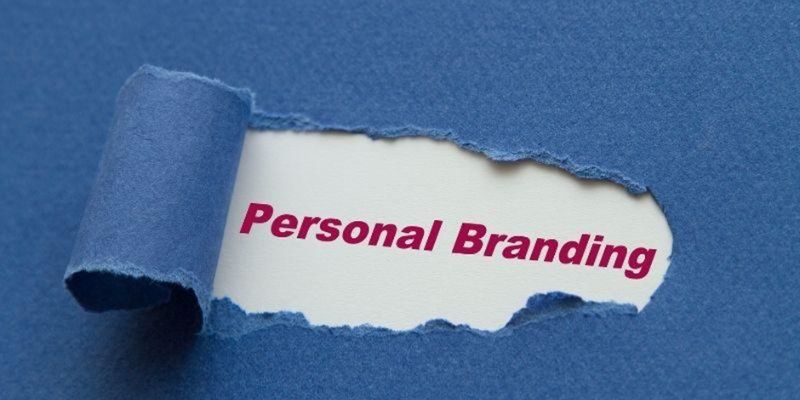In the UAE’s vibrant landscape, personal and business branding are vital forces, each with a unique impact on professionals and enterprises.
This blog attempts to explain the difference between personal and business branding, exploring the purpose of this comparison for individuals and businesses alike.
Personal branding shapes an individual’s identity, emphasizing their unique qualities, expertise, and values.
In a region like the UAE, where personal relationships carry immense weight, cultivating a strong personal brand is integral for professionals seeking to stand out and foster trust in their endeavors.
On the other hand, business branding is the strategic effort to mold and promote a company’s identity, values, and offerings.
In a landscape where entrepreneurship thrives, especially in the UAE’s business-savvy environment, understanding the dynamics of business branding is vital for enterprises aiming to carve a niche in the market.
The purpose of this comparison is not just to highlight the distinctions but to understand how one’s brand contributes to the success of a business and vice versa. What strategies work best for individuals compared to businesses in the context of branding?
We aim to answer these questions, catering to the specific needs of the UAE audience.
Join us as we explore the difference between personal and business branding, providing valuable insights for individuals and enterprises navigating the vibrant landscape of the UAE.
Personal Branding
Building a personal brand as a real estate agent involves cultivating a distinct identity around yourself and shaping how others perceive you. This is particularly crucial in the UAE’s competitive real estate market, where individual reputation holds significant weight.
Want to improve your understanding of personal branding? Enroll in the Personal Branding Mastery course and step confidently into the real estate arena!
Pros of Personal Branding
Here are the perks of personal branding:
- Authenticity and Trust: A well-crafted personal brand builds authenticity, fostering trust among peers, clients, and employers.
- Career Advancement: Elevates professional opportunities by making individuals more visible and attracting career prospects and collaborations.
- Networking: Enhances networking capabilities, as a solid personal brand makes it easier to connect with like-minded individuals and industry leaders.
- Confidence: Boosts self-confidence and self-awareness, empowering individuals to navigate challenges with resilience.
Cons of Personal Branding
Here are some of the cons you need to know about personal branding:
- Time-Consuming: Developing and maintaining a personal brand demands time and consistency, which can be challenging amid busy schedules.
- Public Scrutiny: Increased visibility invites scrutiny, with individuals facing public evaluation, criticism, or misconceptions.
- Balancing Act: Striking the right balance between personal and professional aspects can be tricky, potentially blurring boundaries.
- Evolution Challenges: As individuals grow and evolve, aligning a personal brand with changing aspirations and values may pose challenges.
Understanding these pros and cons is crucial for anyone who wants to evaluate the importance of personal branding in the real estate arena. While it offers substantial benefits, a thoughtful approach is necessary to navigate the potential pitfalls.
Related: Types of Personal Branding
Business Branding
Business branding is a cornerstone for success in the dynamic real estate commerce landscape. It involves crafting a unique identity for a real estate company, encompassing its values, mission, and overall personality.
Pros of Business Branding
Here are some of the cons you need to know about business branding:
- Recognition and Trust: A strong business brand cultivates recognition, fostering trust and loyalty among customers and clients.
- Competitive Edge: Sets a business apart in a crowded market, establishing a distinct presence that attracts and retains customers.
- Marketing Efficiency: Streamlines marketing efforts by providing a cohesive narrative and visual identity, making promotional activities more effective.
- Value Communication: Effectively communicates the values and principles of a business, creating an emotional connection with the audience.
Cons of Business Branding
Here are some of the cons you need to know about business branding:
- Resource Intensive: Developing a robust business brand requires significant time, effort, and financial investment.
- Public Scrutiny: Increased visibility invites scrutiny, with businesses facing public evaluation, criticism, or misconceptions.
- Adaptability Challenges: Adapting a business brand to evolving market trends and consumer preferences can be challenging.
- Rigidity: Once established, altering critical elements of a business brand can be met with resistance, making adaptation difficult.
Understanding the advantages and challenges of business branding in real estate is essential for companies seeking to establish a lasting and impactful presence in the market. A strategic and thoughtful approach is vital for navigating the complexities of brand development.
Key Differences Between Personal and Business Branding
When it comes to the concept of branding in the real estate landscape, whether personal or business-oriented, each approach carries distinct characteristics that shape its effectiveness. Let’s explore the key differences between personal and business branding.
1. Ownership and Control
Personal Branding: Individuals such as brokers and real estate agents have sole ownership and control over their brand, shaping it based on their values and goals.
Business Branding: Involves collective ownership, often managed by a team or board, making decisions based on the company’s vision and objectives.
2. Scope and Audience
Personal Branding: Typically has a narrower scope, targeting a specific audience interested in an individual’s skills, expertise, or personality.
Business Branding: Involves a broader scope, catering to diverse audiences associated with the products or services offered.
3. Emotional Connection and Engagement
Personal Branding: Establishes a profoundly personal and emotional connection, often built on authenticity, relatability, and a sense of individuality.
Business Branding: Aims for a more professional and service-oriented connection, emphasizing reliability, quality, and fulfilling customer needs.
4. Flexibility and Adaptability
Personal Branding: Offers greater flexibility for personal growth and evolution, adapting to the individual’s changing interests or expertise.
Business Branding: This can be more rigid due to organizational structures and predefined brand guidelines, adapting a lengthier process.
5. Longevity and Evolution
Personal Branding: Tied closely to an individual’s career and life journey, allowing for continuous evolution as circumstances change.
Business Branding: Strives for longevity by establishing a timeless identity but may undergo strategic evolution to stay relevant in the market.
Understanding these distinctions is crucial for individuals and businesses alike. The choice between personal and business branding depends on goals, target audiences, and the nature of the products or services offered. Now, let’s summarize these differences in a table:
| Aspect | Personal Branding | Business Branding |
| Ownership and Control | Individual ownership and control | Collective ownership and control |
| Scope and Audience | Narrow scope, specific audience | Broad scope, diverse audience |
| Emotional Connection | Personal, built on authenticity | Professional, service-oriented |
| Flexibility and Adaptability | Greater flexibility for evolution | More rigid, structured guidelines |
| Longevity and Evolution | Tied to an individual’s life journey | Strives for longevity, strategic evolution |
Conclusion
The comparison between personal branding and business branding highlights individuals’ and companies’ distinct strategies to establish their identity.
Choosing between personal and business branding is based on understanding each approach’s unique goals, audiences, and characteristics.
Personal branding thrives on the individuality and authenticity of a person, allowing for a deep emotional connection with a specific audience.
On the other hand, business branding is a collective effort guided by organizational goals and structures. It targets a broader audience and emphasizes professionalism and reliability.
Recognizing these distinctions is crucial for individuals seeking to amplify their presence and businesses aiming to stand out. Whether you’re a professional building, your brand, or a company shaping its business identity, aligning your approach with your objectives is vital.
As you enter the branding arena, consider seeking professional guidance from ThinkProp’s comprehensive real estate training programs. Our experts can provide tailored strategies to enhance your brand presence, ensuring you stand out in the competitive landscape.
Elevate your brand today and leave a lasting impression on your audience!







